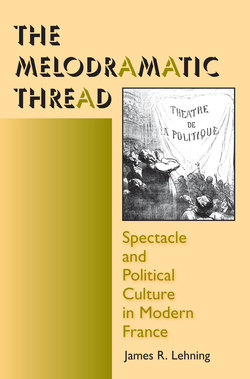The Melodramatic Thread

Реклама. ООО «ЛитРес», ИНН: 7719571260.
Оглавление
James R. Lehning. The Melodramatic Thread
1. Introduction
2. Varieties of Performance in Nineteenth-Century Paris
3. Boulevard Spectacles of the Third Republic
4. Spectacles of Light and Darkness between the World Wars
5. Commercial Spectacles in Postwar Paris
6. Conclusion
1. Introduction
2. Varieties of Performance in Nineteenth-Century Paris
3. Boulevard Spectacles of the Third Republic
4. Spectacles of Light and Darkness between the World Wars
5. Commercial Spectacles in Postwar Paris
6. Conclusion
Отрывок из книги
The Melodramatic Thread
Harvey J. Graff
.....
While Schwartz describes a position of power for the flâneur, the strongest theme in these varied approaches has been an emphasis on ceremonies and spectacles as instruments of social control, a way in which a dominant state, or consumer capitalism, consolidates support. In the end, then, this emphasizes the mystification of an externalized “reality” about the exercise of power through the use of symbols. But this (Durkheimian or Marxian) approach too narrowly construes the relationship between symbol and politics by creating an artificial distinction between the domains of symbol and politics. The anthropologist Victor Turner argued a generation ago that “every type of cultural performance, including ritual, ceremony, carnival, theater, and poetry, is explanation and explication of life itself.”45 For Turner these performances are metacommentaries, stories a group tells about itself, “an interpretive reenactment of its experience,”46 a means by which both actors and spectators reevaluate the social order, and are transformed in the process.47 At about the same time, Clifford Geertz wrote about the “theater state” of nineteenth-century Bali, emphasizing the “expressive nature of the Balinese state,” and its use of spectacle and ceremony in the dramatization of public issues. The state, in Geertz’s reading of Bali, “was a device for the enactment of mass ritual.” And while he contrasted the “theater state” in Bali, in which ceremonies were the central function of the state, with Western states, in which, he claimed, such ceremonies are peripheral to the exercise of power, he in the end suggested that an emphasis on politics as a “domain of social action” misunderstands the role of ideas. These last are not, he argues, “unobservable mental stuff. They are envehicled meanings” that must be interpreted. “The real,” he concludes, “is as imagined as the imaginary,” and the performances of the state were “neither illusions nor lies, neither sleight of hand nor make-believe. They were what there was.”48 More recently, and more relevant to our concern with democratization, Laurence Whitehead has suggested the use of a dramatic metaphor as a heuristic device for the study of democratic transitions, even while suggesting the importance of theatrical techniques for the success of leaders in the process. Theater thus was no longer a metaphor for Whitehead, but rather a fundamental part of the process of democratic transition as it was led by men such as Nelson Mandela, Václav Havel, and Boris Yeltsin.49
While the concerns of Rousseau and Diderot continue to pervade discussions about theatricality and performance in political culture, the insights of Turner, Geertz, and Whitehead suggest that representations of power actively participate in the creation of meanings about the state, the nation, and the use of power. A modern French political culture influenced by forms of public performance must have had strong implications for the creation of French political institutions and practices and for the twists and turns of that creative process, the narrative of French history that we know. But few sources speak to audience reactions to performances: Victor Hugo’s description of the return of Napoleon’s body in 1840, or Maurice Barrès’s description of the funeral of Hugo in 1885, are famous not only because of the literary renown of their authors, but because they are almost unique as first-person accounts of these huge public events.50
.....